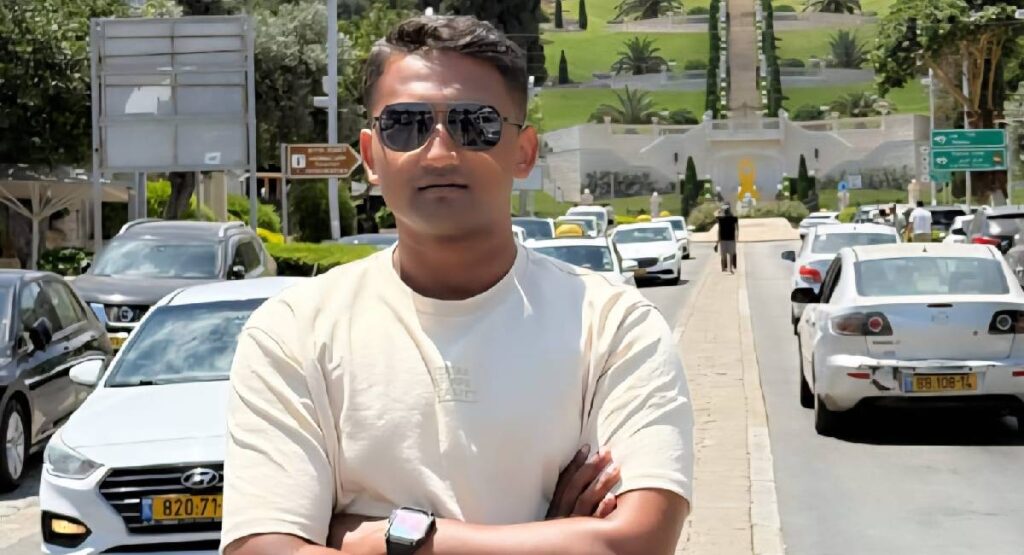When Lieutenant Aritra Sinha took off from Visakhapatnam in early May, his parents imagined a learning journey—not a sudden plunge into danger. But now, the 24‑year‑old Indian Navy officer finds himself stranded in a Tel Aviv hotel, caught amid escalating violence in Israel. His planned training visit has turned into an anxious journey of uncertainty, with missile strikes and closed airspace delaying his safe return home.

A Journey Interrupted
On May 3, Aritra, a proud alumnus of Purulia Sainik School, flew to Israel on a government‑approved training mission. His father, Joy Sankar Sinha, noted, “He was excited—very motivated to learn and serve.” Aritra has been in the Navy since 2022, inspired by Joy’s own experiences working with defence personnel in his private security firm. It’s a part of the family’s legacy: discipline, pride, and service.
Aritra’s mother, Anima, remembers their final goodbye. “He hugged us and said, ‘Don’t worry, Ma.’ He lights up when he talks about duty, but here, far away, duty feels heavy.” And now their brave son—who always reassures them with a calm voice over the phone—is cornered in a hotel that serves as both refuge and trap.
Tensions Escalate Overnight
Aritra was scheduled to return to India on a flight last Friday. But one night, the alarms began. Iran‑backed forces launched a barrage of missiles, and Israel responded in kind. Within hours, Tel Aviv’s airport shut down. Airspace went dark. The flight Aritra needed disappeared from the schedule. Adventure training abruptly became a test of survival.
In repeated phone calls, Aritra tells his parents, “I’m fine. The hotel has bunkers. When the sirens go, I move downstairs. They are safe. I’m safe.” But every word is weighed with anxiety. Joy struggles to stay calm: “He masks the stress—but how long can he sit quietly in a bunker?”
Inside the hotel room, small comforts belie the anxiety: a TV playing old reruns, a mini‑fridge stocked with bottled water, and a desk strewn with naval manuals. Every few minutes, the distant wail of sirens cuts through. He dashes to the bunker, waits in darkness, then returns. Repeat. It’s training the young lieutenant didn’t sign up for—but he endures.
Family Life in Bengal
Back in Mallarpur village, Birbhum district, West Bengal, Joy and Anima follow the news obsessively. Tile by tile, they research each strike reported near Tel Aviv. Student‑neighbors pause to ask, “How is Aritra?” Their concern ripples through the community, as villagers gather at the Sinha home to offer comfort. Cakes, prayer sessions, whispered prayers—they’re all signs of a village facing shared fear.
Anima rarely sleeps. At 2 a.m., she scans her phone’s inbox, hoping for a final boarding pass or evacuation notice. She confesses between tears, “Every phone buzz sends my heart thumping.” Yet she holds herself up for others. “I can’t collapse. I must pray—and hope.”
The Bigger Picture
India is not alone. Around a hundred Indian citizens—students, professionals, tourists—are also stranded in Israel. Many work in tech or research, while others study in universities. Foreign ministries, including in New Delhi, Pakistan, and Bangladesh, have launched evacuation protocols. But their processes move slowly—flights are full or canceled, and diplomatic corridors are narrow and crowded.
A Naval spokesperson in India confirmed that evacuation plans are ongoing. Talks are underway with Israeli authorities, commercial carriers, and military flight services to get Indians home. But when airspace is restricted and military operations intensify, even the best‑laid plans face turbulence.
What Aritra Hears and Feels
Despite avoiding details, Aritra doesn’t hide everything. “Sirens shriek twice today,” he told his parents. “They say some fall outside the city—but we don’t take chances.” He refuses to watch the news because “it freaks me out, Ma.” Instead, he focuses on what he can control: exercises on posture, naval drills, keeping his body ready—mental and physical discipline, the Navy way.
He writes in his rhythm: “Here, even a routine day feels like training under fire. I’m learning to stay calm. I remember our classes in Sainik School—about grit. Now I need that grit more than ever.”
A Mother’s Worry
Anima’s pain is palpable: “They say he’s safe. But how do I know? I can’t hide having a mother’s heart.” She held his little cricket bat yesterday—his childhood keepsake—and rocked with it in her arms. She placed it on the prayer altar, lit incense, and repeated, “Bring him back.” Matching phone pings to more reports. How many sirens? How many rockets? Each one is a fresh tear.
Lessons in Diplomacy
This crisis has shown how global conflicts complicate individual lives. Diplomats in New Delhi and Tel Aviv exchange communications. Locally, Indian embassy officials in Israel are coordinating with their counterparts, arranging convoys, standby hospitality, and medical shelters. Strike alerts share close‑call updates. Checks on who is injured, who needs medication, who can travel. It’s operational—and deeply personal.
Joy explains: “Nobody can reveal everything, but I can feel they’re trying. My Aritra is an officer. They will help.” He adds thoughtfully, “In a crisis, diplomacy is like a silent anchor. We must trust it.”
Outlook and Hope
For now, Aritra remains in the hotel—safe, fit, and resolute. Each missed flight, each siren, each delay weighs heavily. But he’s young, trained, and determined. His heart is set on home.
Neighbours in Mallarpur have organized a community prayer meeting tonight. They will light lamps, hum bhajans, and pray for every soul waiting to return. On Facebook, a #BringBackAritra hashtag circulates, with people sharing family photos, messages: “We wait. We pray. We trust.”
Joy says he has packed Aritra’s favorite tea in small sachets—earl grey—and will hand it to him the moment he lands. It’s a simple symbol: warmth, familiarity, home.
